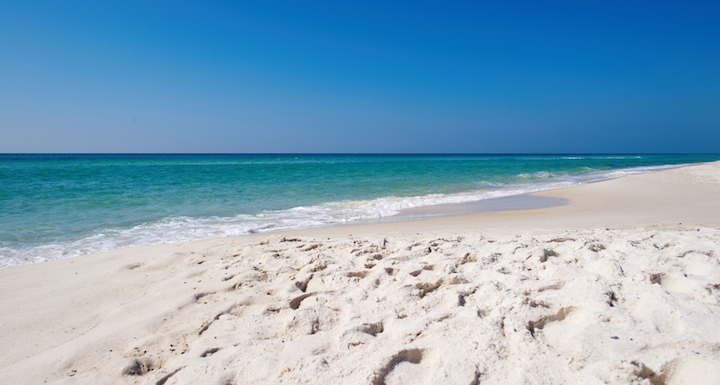As spring is struggling to establish itself here in Australia, summer is ending in the Northern Hemisphere. I hope my US friends are enjoying the last of the sun, and with it time on the beach. As a poor swimmer and a ginger (redhead), I’ve had a somewhat ambiguous relationship with the beach. But it’s always been a place of fascination for me.
Walking along the beach, I ponder the grains of sand beneath my feet. Beach sand comes in one of two types. The first is made of silica in the form of quartz, and is light in colour. The second type occurs in the tropics (where my favourite beaches are found) and is made of calcium carbonate–from the shells and skeletons of dead corals, molluscs and organisms called foraminifera.
You can see a whole gallery of sand grains under the microscope here. Whether I’m looking at the shells or dead seaweed or the sand itself, the beach reminds me of death. And death is a difficult subject—even if we’re just talking about the death of very simple creatures whose lives have been turned into sand.
For many Christians, death of any kind is introduced by the Fall of Adam and so presents us with a moral problem. But death in nature can also be reckoned with as a creative force—a mechanism within creation which contributes to the diversity of life. But whether death is natural and part of the way the universe is meant to work or unnatural and something God will ultimately overcome, death is something to contend with in the here and now.
A walk on the beach reminds me of mortality.
As I walk, I think too about how death might be redeemed. Animal death contributes to the life of another, suggesting that nature itself is cruciform because of the struggles it faces, not in spite of them. A walk on the beach is a reminder of that, as I stoop to pick up shells.
Of course, what we see washed up is but a fraction of the teeming mass in the oceans—although now, thanks to overfishing, rising ocean temperatures, the acidifying of the oceans, oil spills, and dead zones caused by overuse of fertiliser, it is a dwindling mass. Not only is this a problem ecologically—eroding ecosystems dangerously and our own life support—and economically—risking fishery collapse and tourism in many parts of the world. It is also a disaster doxologically.
In Psalm 104, we read that God’s manifold works declare God’s wisdom. This includes the sea—“great and wide, creeping things innumerable are there, living things both small and great.” Any diminution of the sea’s multitudes is a reduction in that which praises God. To be sure, humans have to feed themselves. But when humans consume and pollute to the extent that the seas are threatened, this is not dominion (Genesis 1:26), but a denial of the blessing to “be fruitful and multiply and fill the waters in the seas.”
Sea creatures receive the same kind of blessing as humans in the creation story.
The activities of human culture (burning fossil fuels, highly consumptive lifestyles) have an impact on nature. But nature also has an impact on culture. It is helpful to understand the idea of chaos in the Old Testament. In The Lost World of Genesis One, John Walton points out how the creation account is one of bringing order to chaos. In the beginning of God’s creation, the world was “formless and void.”
What follows are three days of giving form and three days of filling.
Of particular interest for the thoughtful beachgoer is the giving of form on days 2 and 3, separating the waters above from the waters below and the dry land from the waters. The Flood in Genesis 8 represents an act of uncreation by God, as the dry land disappears as the heavens flood the earth.
As Gregory Mobley points out in The Return of the Chaos Monsters, one of the agents of destruction is Leviathan, the untamable creature of Job 41, among the sea monsters that God made. All of this demonstrates that God holds back the forces of chaos, which human sin can unleash.
Climate change, with associated planetary warming, rising sea levels and acidifying oceans, is an example of how human sin can release chaos in nature. Human induced climate change should force us to recognise that human sin—greed, nationalism, and a Baal-like worship of fossil fuels—can unleash climate chaos. Beaches will be eroded and eventually inundated if we continue on this present path, and these very places of recreation, enjoyment and deep theological reflection will become places of mourning, with the Earth, coast and sea groaning in the birth pains under human misrule (Romans 8:19–23).
Don’t let me rain on your sunny day at the beach, but among the sandcastle building, swimming and sun soaking, reflect upon your God-given calling to worship and work; reflect and respond. Let’s not be those who simply say “peace, peace” where there is no peace, blithely enjoying our day in the sun while ignoring that our way of life may not last.
Instead, enjoy your life “under the sun” in a way that protects it for generations to come.

